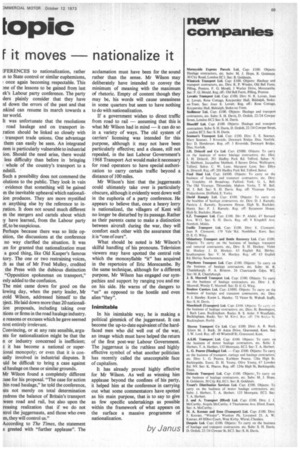topic
Page 67

If you've noticed an error in this article please click here to report it so we can fix it.
I it moves nationalize it
1FERENCES to nationalization, rather in to State control or similar euphemisms, : once again becoming respectable. This 3ne of the lessons to be gained from last ek's Labour party conference. The party ders plainly consider that they have id down the errors of the past and that nkind can resume its march towards a ter world.
It was unfortunate that the resolutions road haulage and on transport inration should be linked so closely with transport trade unions. One advantage them can easily be seen. An integrated gem is particularly vulnerable to industrial ion. Should the need arise, there would less difficulty than before in bringing whole of the country's transport to a ndstill.
Such a possibility does not commend the olutions to the public. They look in vain evidence that something will be gained m the inevitable upheaval which nationaliion produces. They are more mystified in anything else by the reference to inration. It does not sound much different m the mergers and cartels about which 7 have learned, from the Labour party ;If, to be suspicious.
Perhaps because there was so little opsition, the discussions at the conference no way clarified the situation. It was :en for granted that nationalization must a good thing, like Old Kasper's famous tory. The one or two restraining voices, ;h as that of Mr Fred Mulley, credited the Press with the dubious distinction "Opposition spokesman on transport," rely added to the confusion.
The mist came down for good on the lowing day, when the party leader, Mr isold Wilson, addressed himself to the zject. He laid down more than 20 nationaliion proposals, including taking over lions or firms in the road haulage industry. e reasons or excuses which he gave seemed nost entirely irrelevant.
Convincing, or at any rate sensible, argunts for nationalization might be that the n or industry concerned is inefficient; I it has become a national or superional monopoly; or even that it is conually involved in industrial disputes. It uld be difficult to bring a case against id haulage on these or similar grounds.
Mr Wilson found a completely different ;use for his proposal. "The case for action hin road haulage," he told the conference, ;sts not merely on total determination redress the balance of Britain's transport ween road and rail, but also upon the Teasing realization that if we do not itrol the juggernauts, and those who own :in, they will control us."
According to The Times, the statement s greeted with "further applause". The acclamation must have been for the sound rather than the sense. Mr Wilson may deliberately have intended to convey the minimum of meaning with the maximum of rhetoric. Empty of content though they may be, his words will cause uneasiness in some quarters but seem to have nothing to do with nationalization.
If a government wishes to direct traffic from road to rail assuming that this is what Mr Wilson had in mind it can do so in a variety of ways. The old system of carriers' licensing was intended for this purpose, although it may not have been particularly effective; and a clause, still not repealed, in the last Labour Government's 1968 Transport Act would make it necessary for road operators to have special authorization to carry certain traffic beyond a distance of 100 miles.
Mr Wilson's hint that the juggernauts could ultimately take over is particularly obscure, although it evidently went down well in the euphoria of a party conference. He appears to believe that, once a heavy lorry is nationalized, the villagers of Kent will no longer be disturbed by its passage. Rather as their parents came to make a distinction between aircraft during the war, they will comfort each other with the assurance that it is "one of ours".
What should be noted is Mr Wilson's skilful handling of his pronouns. Television viewers may have spotted the central role which the monosyllable "it" has acquired in the repertoire of Eric Morecambe. By the same technique, although for a different purpose, Mr Wilson has engaged our sympathies and support by ranging you and me on his side. He warns of the dangers to "us" as opposed to the hostile and even alien "they".
Inimitable hi his inimitable way, he is making a political gimmick of the juggernaut. It can become the up-to-date equivalent of the hardfaced men who did well out of the war, an image which must have helped the return of the first post-war Labour Government. The juggernaut is the ruthless and highly effective symbol of what another politician has recently called the unacceptable face of capitalism.
It has already proved highly effective for Mr Wilson. As well as winning him applause beyond the confines of his party, it helped him at the conference in carrying out what some commentators have spotted as his main purpose, that is to say to give as few specific undertakings as possible within the framework of what appears on the surface a massive programme of nationalization.
by Janus




















































































































